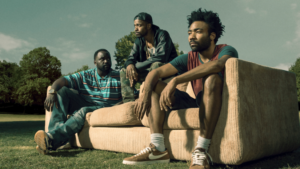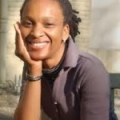You have no items in your cart. Want to get some nice things?
Go shopping I was in elementary school when one of our family friends’ sons married an African American. The news was delivered to my parents with the same gravitas and despair that the news of a death might have been. In my memory, there were even condolence visits to the parents of the young man – though I am sure there was nothing of the sort, really, and perhaps the gravitas and despair I imagine the news being delivered with is mixed up with another, sadder memory. But I do remember that relatives who were going to America to study were told not to “go there and be like black Americans.” They were admonished to “remember where you come from.” It was a difficult burden to place on these young people, many of whom succumbed immediately to the lure of black American culture, the men sending home pictures of themselves with pierced ears and massive jherri curls and who swelled Enugu, the city I grew up in in southeastern Nigeria, with their “parries” and “wanna gonnas.” Parents groaned about their “lost children.”
I was in elementary school when one of our family friends’ sons married an African American. The news was delivered to my parents with the same gravitas and despair that the news of a death might have been. In my memory, there were even condolence visits to the parents of the young man – though I am sure there was nothing of the sort, really, and perhaps the gravitas and despair I imagine the news being delivered with is mixed up with another, sadder memory. But I do remember that relatives who were going to America to study were told not to “go there and be like black Americans.” They were admonished to “remember where you come from.” It was a difficult burden to place on these young people, many of whom succumbed immediately to the lure of black American culture, the men sending home pictures of themselves with pierced ears and massive jherri curls and who swelled Enugu, the city I grew up in in southeastern Nigeria, with their “parries” and “wanna gonnas.” Parents groaned about their “lost children.”
It would be many years later, in 2004, before Bill Cosby delivered his infamous “Pound Cake speech,” at the fiftieth-anniversary commemoration of the Brown v. Topeka Board of Education Supreme Court Decision, where he tore into everything from black vernacular to African Americans giving their children Africanesque names. “We are not Africans. Those people are not Africans; they don’t know a damned thing about Africa. With names like Shaniqua, Shaligua, Mohammed and all that crap and all of them are in jail.” Black conservatives applauded him for confronting what they considered the truth of their own “lost children.” (This was well before his long history of sexually abusing women and children became public and pretty much everyone stopped applauding him.)
In 2013 when J. and I decided to move to the United States, we very consciously chose Atlanta. We wanted somewhere urban, but also, after years in a small Belgian city, we wanted a place where our four sons could be part of a bigger, more dynamic black population. What only became apparent after we moved and concentrated on finding good schools for our children was how segregated Atlanta (and by extension, America) was. Much has been said of the quality of American public education (Betsy DeVos as Education Secretary has only deepened fears of a worsened educational landscape) but what is less known from the outside is that there are pockets of excellent public schools. However, your neighborhood determines whether your children have access to them or not. Slavery and racism (institutionalized and otherwise) have contributed to consistently keeping black people poorer than whites in this country, and economic segregation therefore overlaps with color segregation. To put our children in good public schools meant that the black community I had imagined for them was close to impossible. The American melting pot I envisaged has shrunk to a community in the suburbs where well-meaning neighbors place snippets of black achievement from newspapers in my mailbox, and tell me that they voted for Obama (and Carson). To discourage loiterers, and to enhance the visibility of “others,” the neighborhood voted years ago against sidewalks and public transportation. To find the kind of black community I had imagined before relocating to the States, I had to immerse myself in the Nigerian community.
The anxiety our parents had about their children becoming like African Americans seems to have seeped in and settled into the bones of Nigerians raising their children in America. There is an anxiety that our children be American (speak without any discernible accent) but not be (too) American (like the people Bill Cosby castigated). When Trump made his ignoble shit-hole comment, there was no shortage of Nigerians (and Africans in general) on social media pointing out just how much people from our part of the world have contributed, and continue to contribute, to this country. The Organization for the Advancement of Nigerians reeled out statistics: 43 of the 96 graduating Pharm.D. candidates at Howard University in 2016 were Nigerians, and 16 of 27 academic-excellence awards handed out went to Nigerians. Howard is an HBCU , and so has a preponderance of black students. It is easy to read the undertone here: “We might be black but we are different.” What such defenses failed to see was that Trump was not just disparaging countries with black and brown people, he was insulting African Americans, whose ancestors came from these countries, as well. In the eyes of Trump and people like him, there was no difference between the African American and the African. The alt-right gang doesn’t discriminate between African Americans and Africans.
The political/social fracture in the grouping labelled “people of color” is relatively new but it is deep-seated (and sometimes breeds resentment). Forty, fifty years ago, there was a sense of shared struggle that held black (and brown people even) together, with few signs that a subset felt superior to the other or had more right to a certain kind of blackness than the other. Now, that division manifests itself in both the private space and the public one. You cannot be black in America today without being some sort of black. In 2017, Samuel L. Jackson criticized the casting of the black British Daniel Kaluuya as an American in Get Out, preferring that such roles went to “brothers.” In one of episode of Donald Glover’s comedy-drama series Atlanta, Darius asks Earn if he knows Steve McQueen and then follows up with, “Black people don’t know Steve McQueen.” When Earn reminds him that he, Darius is black, he counters with: “But I’m Nigerian.” The subtext is that the Nigerian black is different, even while under the same social and (presumably) economic conditions than the American black. Earn spent a year at Princeton (and so is certainly not dumb) but he is still “American” and, as far as Darius is concerned, that trumps his education. I laughed because it was familiar. How often have I heard, in the homes of my successful Nigerian brothers and sisters, how much smarter, how much more ambitious and hardworking we were (than our African American brothers and sisters). It was the sort of throwaway comment that we have become used to, and which stops us from examining the underlying reasons, the lifetime of racism, starting with the slave trade, America’s original sin, that has ensured that America’s black remains at the margins. As I often do while watching Glover’s brilliant series, I wondered if I ought to laugh, if what I have heard is not a reinforcement of stereotypes, a mirror magnifying the divide between African Americans and African-Americans. I found it unsettling but ultimately, I have come to accept that Atlanta’s strongest appeal is perhaps that it does not shirk away from uncomfortable issues. And that is what good art does: it rattles.

About Chika Unigwe
Chika Unigwe is a Nigerian writer. She is the author of fiction, poetry, articles and educational material. Her latest novel, Night Dancer, was published in Dutch in 2011 (as Nachtdanser) and in English in 2012



